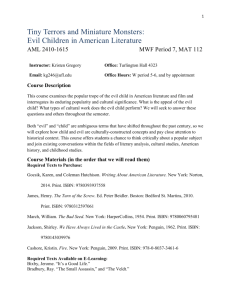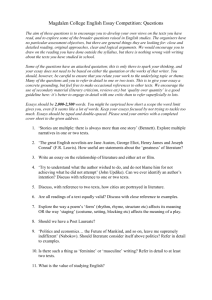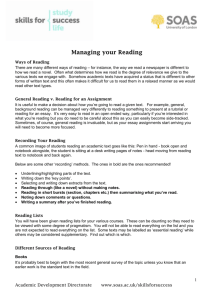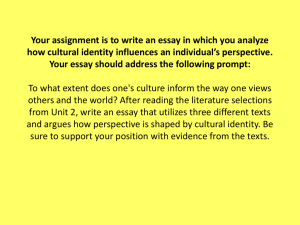AML 2070, Section 1625, Gregory
advertisement
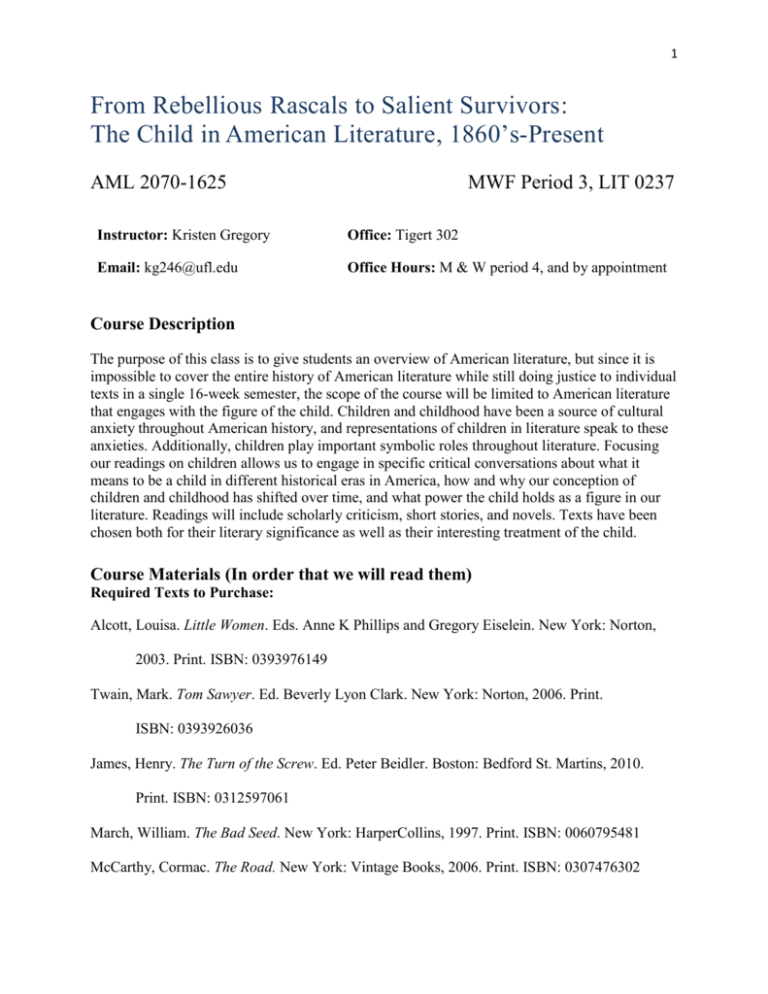
1 From Rebellious Rascals to Salient Survivors: The Child in American Literature, 1860’s-Present AML 2070-1625 MWF Period 3, LIT 0237 Instructor: Kristen Gregory Office: Tigert 302 Email: kg246@ufl.edu Office Hours: M & W period 4, and by appointment Course Description The purpose of this class is to give students an overview of American literature, but since it is impossible to cover the entire history of American literature while still doing justice to individual texts in a single 16-week semester, the scope of the course will be limited to American literature that engages with the figure of the child. Children and childhood have been a source of cultural anxiety throughout American history, and representations of children in literature speak to these anxieties. Additionally, children play important symbolic roles throughout literature. Focusing our readings on children allows us to engage in specific critical conversations about what it means to be a child in different historical eras in America, how and why our conception of children and childhood has shifted over time, and what power the child holds as a figure in our literature. Readings will include scholarly criticism, short stories, and novels. Texts have been chosen both for their literary significance as well as their interesting treatment of the child. Course Materials (In order that we will read them) Required Texts to Purchase: Alcott, Louisa. Little Women. Eds. Anne K Phillips and Gregory Eiselein. New York: Norton, 2003. Print. ISBN: 0393976149 Twain, Mark. Tom Sawyer. Ed. Beverly Lyon Clark. New York: Norton, 2006. Print. ISBN: 0393926036 James, Henry. The Turn of the Screw. Ed. Peter Beidler. Boston: Bedford St. Martins, 2010. Print. ISBN: 0312597061 March, William. The Bad Seed. New York: HarperCollins, 1997. Print. ISBN: 0060795481 McCarthy, Cormac. The Road. New York: Vintage Books, 2006. Print. ISBN: 0307476302 2 Collins, Suzanne. The Hunger Games. New York: Scholastic, 2010. Print. ISBN: 0439023528 Required Texts Available on E-Learning: Jewett, Sarah Orne. “A White Heron.” Twain, Mark. “The Story of the Good Little Boy,” and “The Story of the Bad Little Boy.” Chopin, Kate. “A Shameful Affair.” Bixby, Jerome. “It’s a Good Life.” Matheson, Richard. “Born of Man and Woman.” Bradbury, Ray. “The Small Assassin,” and “The Veldt.” LeGuin, Ursula K. “The Ones Who Walk Away from Omelas.” We will also read supplementary scholarly criticism to be determined by the instructor Course Outcomes: By the end of the semester, students should be able to engage in scholarly conversations about American literature, American culture, and childhood studies. Students should be able to make historical, literary historical, critical or theoretical statements about the texts we’ve read and should be able to support those statements. Students should be able to think critically about literature and construct cohesive, convincing arguments about literature. Additionally, students should have refined their basic writing skills, including MLA documentation style, drafting, proofreading, editing, and composing a polished final product. Assignments and Participation: 5 Critical Reading Responses (400 words) 25% Students will engage with a critical question about the novels that we read and construct a brief argument in answer to that question. Students must complete one Critical Reading Response for four out of the six assigned novels. These assignments will allow students to receive instructor feedback on critical interpretation and composition skills. Proposal (300 words) 5% Students will propose a topic for their final argumentative essay. Proposals should detail a primary text, a tentative argument, contexts/theories the paper will incorporate, and a list of possible research sources. Annotated Bibliography (1200 words) 15% Students will read and annotate ten research sources for their Final Argumentative Essay. Each annotation needs to summarize the source and explain its significance to the student’s arguments. Final Argumentative Essay (2500 words) 25% For this final assignment, students should compose a detailed argument that engages with one of the texts we read in class. Students can choose between working with a primary text we read throughout the semester or choosing a piece of theory or criticism we read in the class and applying it to a more contemporary text. Regardless, I expect the final essay to make an original contribution to our understanding of the text, not to simply repeat ideas that we discussed in the class. Peer Review 5% Students will participate in a peer review workshop of the final papers and will be expected to give thoughtful, constructive feedback to their peers. 3 Participation 25% This class depends on lively and informed class discussions, which means that students are expected to come to class having read the texts and prepared to contribute talking points or raise questions in the discussion. If I ever notice a lull in class participation that suggests students are not prepared to discuss the readings, then I will begin assigning pop quizzes over the reading. Grades: Grading Scale A 93-100% B 83-86.9% C 73-76.9% D 63-66.9% A- 90-92.9% B- 80-82.9% C- 70-72.9% D- 60-62.9% B+ 87-89.9% C+ 77-79.9% D+ 67-69.9% E 0-59.9% General Assessment Rubric A Insightful: You did what the assignment asked for at a high quality level, with care and precision, and your work shows originality and creativity. Work in this range shows all the qualities listed below for a “B,” but it also demonstrates that you took extra steps to be original or creative in developing content and style. Work in the “A” range is not only convincing and intriguing, but also illuminating. Since careful editing and proofreading are essential in writing, papers in the A range must be free of typos and grammatical or mechanical errors. B Proficient: You did what the assignment asked of you at a high quality level. Work in this range is competent, thoughtful, and considered, but it needs revision. To be in the “B” range, an essay must be complete in content, be well organized, and show special attention to style. C Satisfactory: You did what the assignment asked of you and demonstrated that you have a generalized comprehension of the ideas/films/essays you’re working with. Work in this range needs significant revision, but it is complete in content and the organization is logical. Diction may be imprecise or unclear. The style is straightforward but unremarkable. D Poor: You did what the assignment asked of you at a poor quality level. Work in this range needs significant revision. The content is often incomplete and/or the organization is hard to discern. Support is irrelevant, overgeneralized, lacks validity, and/or is absent. Ideas/texts are oversimplified. Work in this range may have no thesis statement, or may stray significantly from the thesis throughout the essay. Attention to style is often nonexistent or uneven. E An E is usually reserved for people who don't do the work, or don't come to class, or those who have plagiarized. However, if your work shows little understanding of the needs of the assignment or demonstrates that you put little effort in completing it, you will receive a failing grade. 4 *You must pass this course with a “C” or better to satisfy the CLAS requirement for Composition (C) and to receive the 6,000-word University Writing Requirement credit (E6). You must turn in all papers totaling 6,000 words to receive credit for writing 6,000 words. NOTE ALSO: a grade of “C-” will not confer credit for the University Writing Requirement or the CLAS Composition (C) requirement. Course Policies Participation and Attendance Regular attendance and active participation are crucial. Class participation includes contributing to class discussions; coming to class on time, prepared with books and homework; preparing for in-class activities; providing adequate drafts for group work; collaborating and participating in group activities; and overall working and paying close attention to the lectures and activities of the classroom. In general, students are expected to contribute constructively to each class session. Because this class depends on student-led discussion, you must bring the texts to each class and be prepared with notes and questions to contribute to the class. In this course we will follow a strict attendance policy. If you miss more than three periods during the term, you will receive a 3% deduction from your final grade for each absence after the third. If you miss more than 6 classes, you will fail the entire course. The university exempts from this policy only those absences involving university-sponsored events, such as athletics and band, and religious holidays. Absences related to university-sponsored events must be discussed with me prior to the date that will be missed. You should expect all absences to have a negative impact on grades. Please Note: If you are absent, it is your responsibility to make yourself aware of all due dates. If absent due to a scheduled event, you are still responsible for turning assignments in on time. Tardiness: Tardiness creates a problem for the entire class since it can disrupt work in progress. Tardiness will be reflected in lost points. Classroom Conduct Please treat your classmates and myself with respect. Keep in mind that students come from diverse cultural, economic, and ethnic backgrounds. Some of the texts we will discuss and write about engage controversial topics and opinions. Diversified student backgrounds combined with provocative texts require that you demonstrate respect for ideas that may differ from your own. Disrespectful behavior will result in dismissal, and accordingly absence, from the class. Any use of electronic devices not related to classroom learning: phones, personal data assistants, iPods, etc. are disruptive and will not be tolerated. Please turn them on silent and keep them out of sight. Assignment Maintenance Responsibilities You are responsible for maintaining copies of all work submitted in this course and retaining all returned, marked work until the semester is over. Should the need arise for a resubmission of papers or a review of marked papers, it is the your responsibility to have and to make available this material. Late Work Policy and Mode of Submission 5 I do not accept late work. All papers will be submitted as MS Word (.doc) or Rich Text Format (.rtf) documents to E-learning. I may consider extenuating circumstances, but you must contact me at least twenty-four hours before the assignment is due. All drafts should be polished and presented in a professional manner. All papers must be in 12-point Times New Roman font, single-spaced with 1-inch margins and numbered pages. Final Grade Appeals Students may appeal a final grade by filling out a form available from Carla Blount, Program Assistant in Department of English. Grade appeals may result in a higher, unchanged, or lower final grade. University Policies General Education This is a General Education course providing student learning outcomes listed in the Undergraduate Catalog. For more information, see https://catalog.ufl.edu/ugrad/current/advising/info/general-education-requirement.aspx Statement of Composition (C) Credit This course can satisfy the UF General Education requirement for Composition. For more information, see: https://catalog.ufl.edu/ugrad/current/advising/info/general-educationrequirement.aspx Statement of Writing Requirement This course can provide 6000 words toward fulfillment of the UF requirement for writing. For more information, see: https://catalog.ufl.edu/ugrad/current/advising/info/writing-and-mathrequirement.aspx Students with Disabilities The University of Florida complies with the Americans with Disabilities Act. The Disability Resource Center in the Dean of Students Office provides information and support regarding accommodations for students with disabilities. For more information, see: http://www.dso.ufl.edu/drc/. The office will provide documentation to the student who must then provide this documentation to the instructor when requesting accommodation. Statement of Harassment UF provides an educational and working environment that is free from sex discrimination and sexual harassment for its students, staff, and faculty. For more about UF policies regarding harassment, see: http://www.dso.ufl.edu/sccr/sexual/ Statement on Academic Honesty All students must abide by the Student Honor Code. For more information about academic honesty, including definitions of plagiarism and unauthorized collaboration, see: http://www.dso.ufl.edu/sccr/honorcodes/honorcode.php 6 Reading Schedule Monday Wednesday Friday Syllabus and Intros Childhood Studies Unit Intro Week One (8/25) th Unit One: A Season of Freedom: Tomboys and Hooligans in the 19 Century No Class Little Women Little Women Week Two (9/1) Little Women Little Women Little Women Week Three (9/8) Week Four (9/15) Week Five (9/22) “A White Heron” Twain Short Stories Tom Sawyer Tom Sawyer Tom Sawyer CCR1 Tom Sawyer Tom Sawyer CCR2 Unit Two: Innocent Angels: Vulnerable Children in the Age of the Child Unit Intro Turn of the Screw Turn of the Screw Week Six (9/29) Turn of the Screw Turn of the Screw Turn of the Screw Week Seven (10/6) Turn of the Screw Chopin, “A Shameful Final Projects Discussion Week Eight (10/13) conclusion, “A Critical History” CCR3 Affair” Unit Three: Bad Seeds and Rotten Apples: Sinister Children in the 20th Century Mini Conferences Proposal Due Matheson, “Born of Week Nine (10/20) Unit Intro Week Ten (10/27) Week Eleven (11/3) Bradbury, “The Veldt” and “Small Assassin” The Bad Seed The Bad Seed The Bad Seed Unit Four: Beacons and Scapegoats : Symbolic Children in Dystopias Writing Lesson The Road Week Twelve (11/10) Week Thirteen (11/17) Annotated Bibliography Due The Road The Road Man and Woman” Bixby, “It’s a Good Life” The Bad Seed The Bad Seed CCR4 The Road The Road CCR5 No Class Rough Draft Due No Class Week Fifteen (12/1) Le Guin, “The Ones Who Walk Away from Omelas” Writing Workshop Writing Workshop The Hunger Games Week Sixteen (12/8) The Hunger Games The Hunger Games CCR6 Reading Day-No Class Week Fourteen (11/24) *Final Essay Due on our Exam Day

